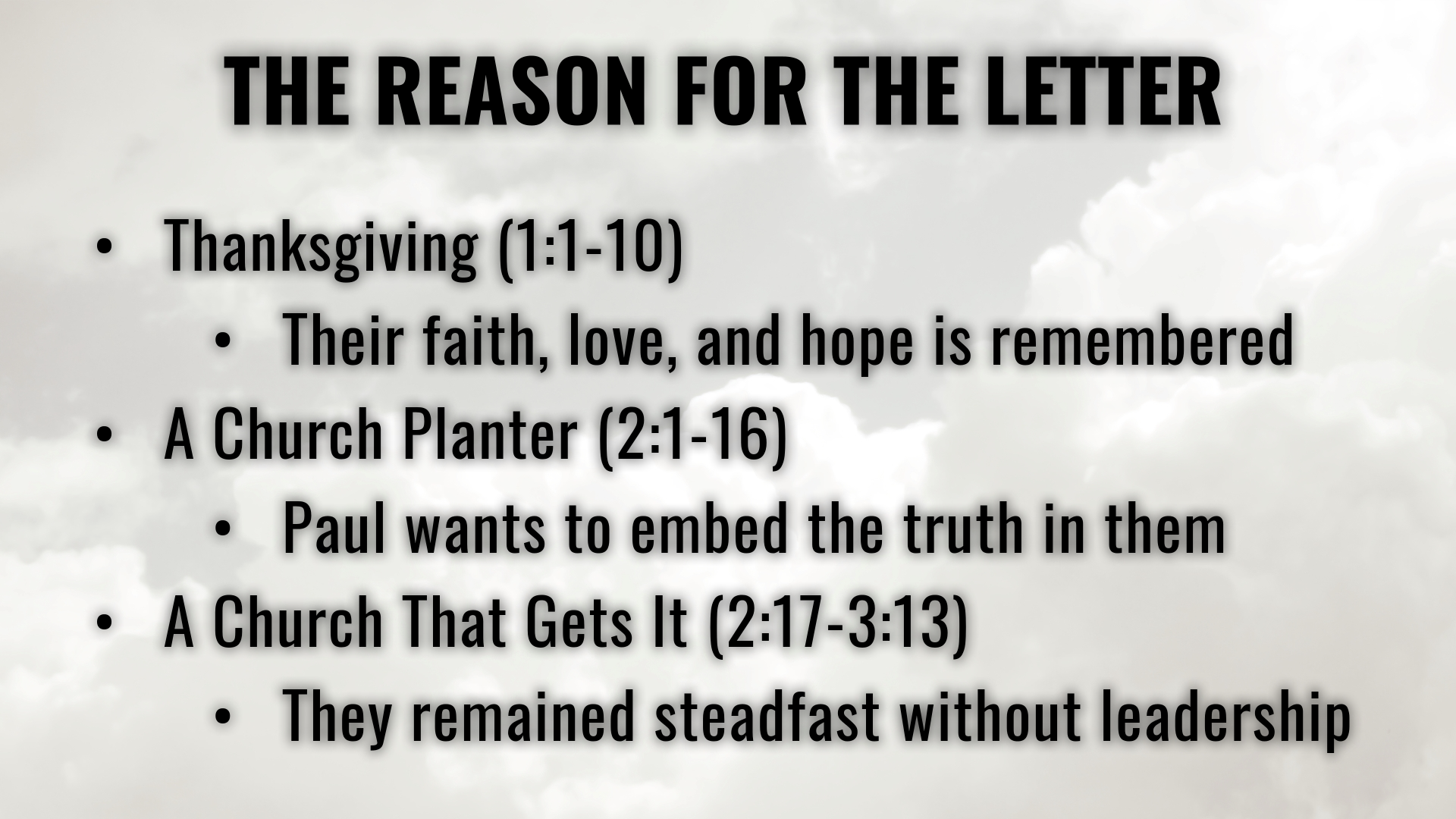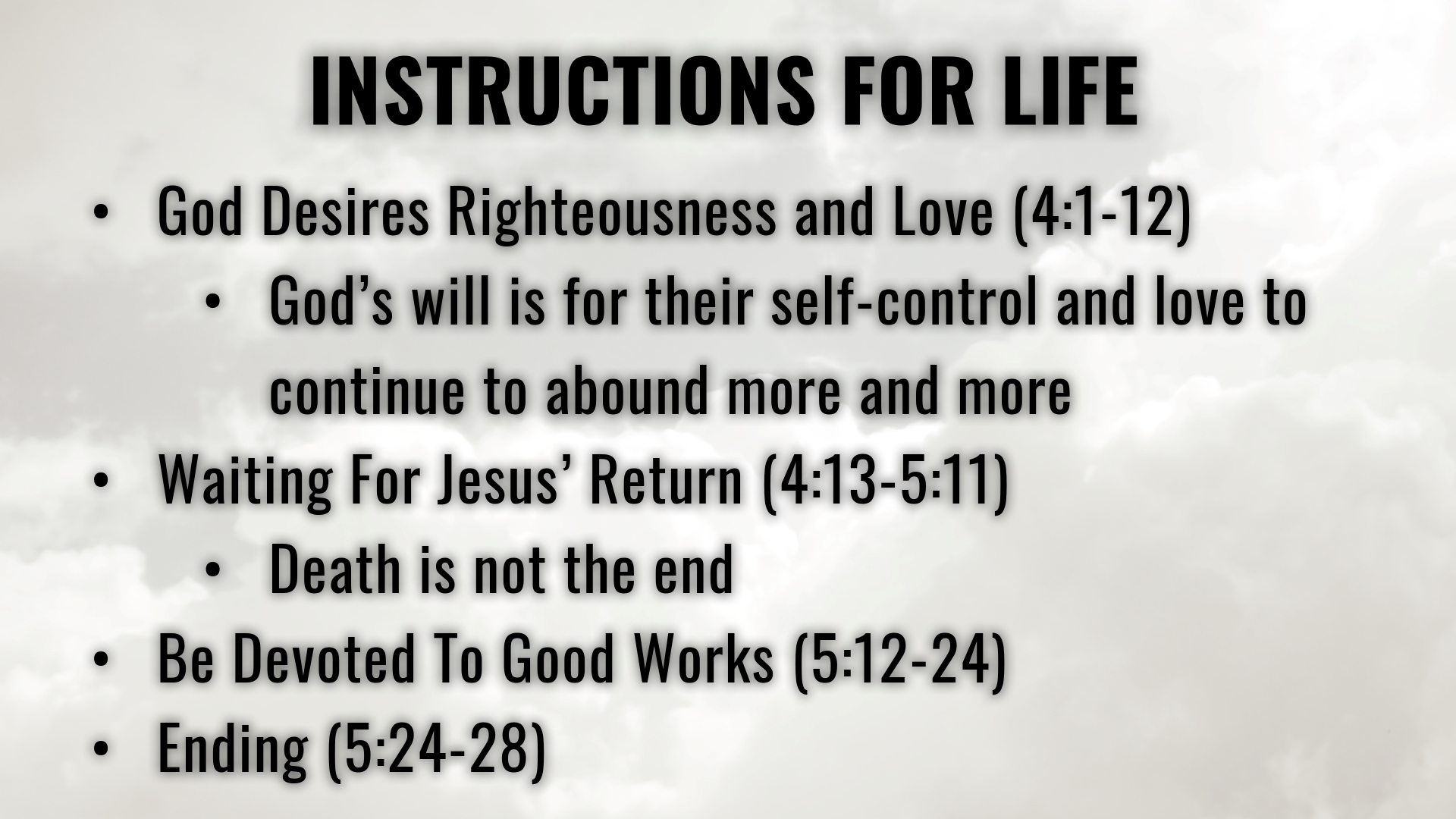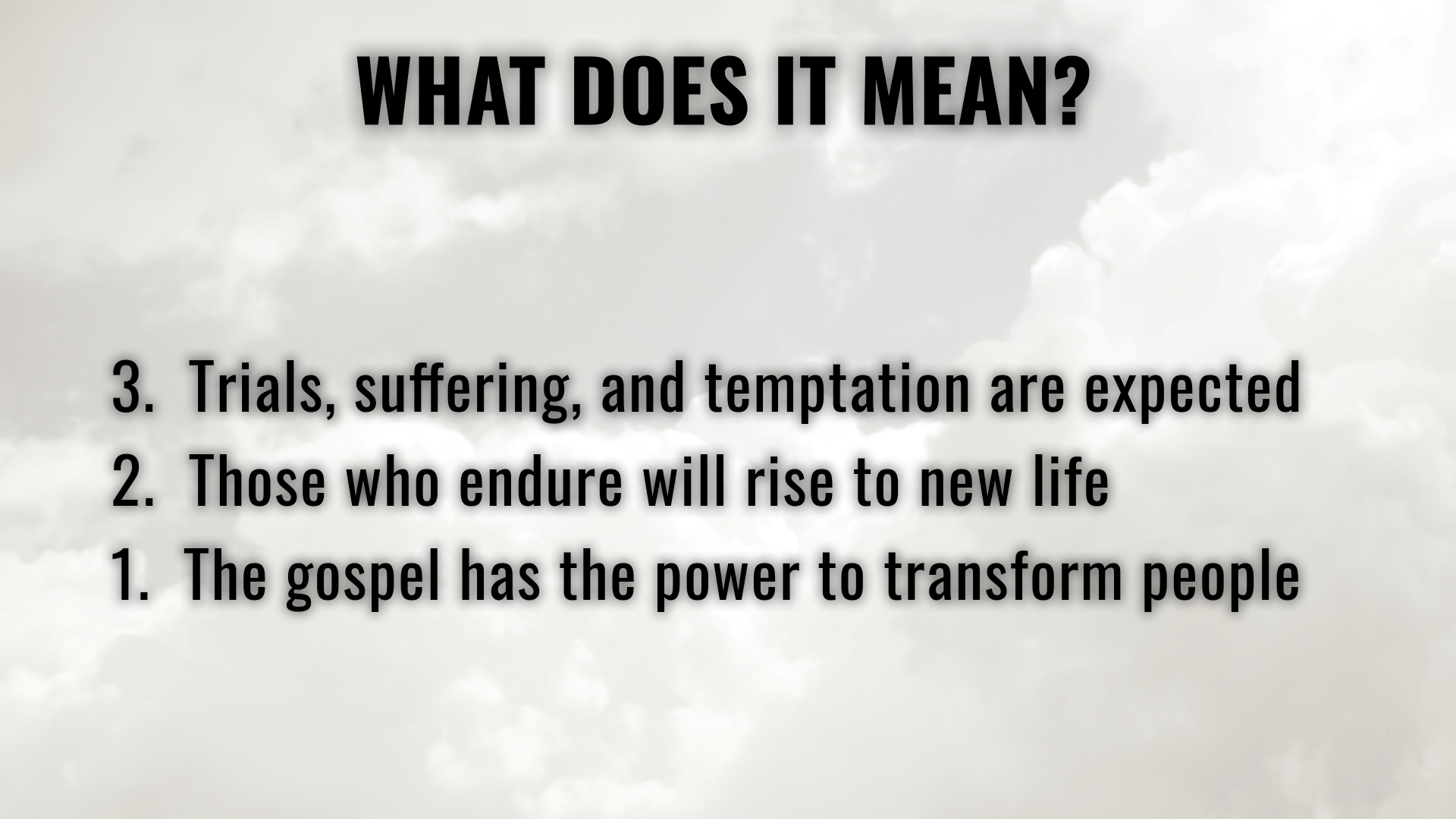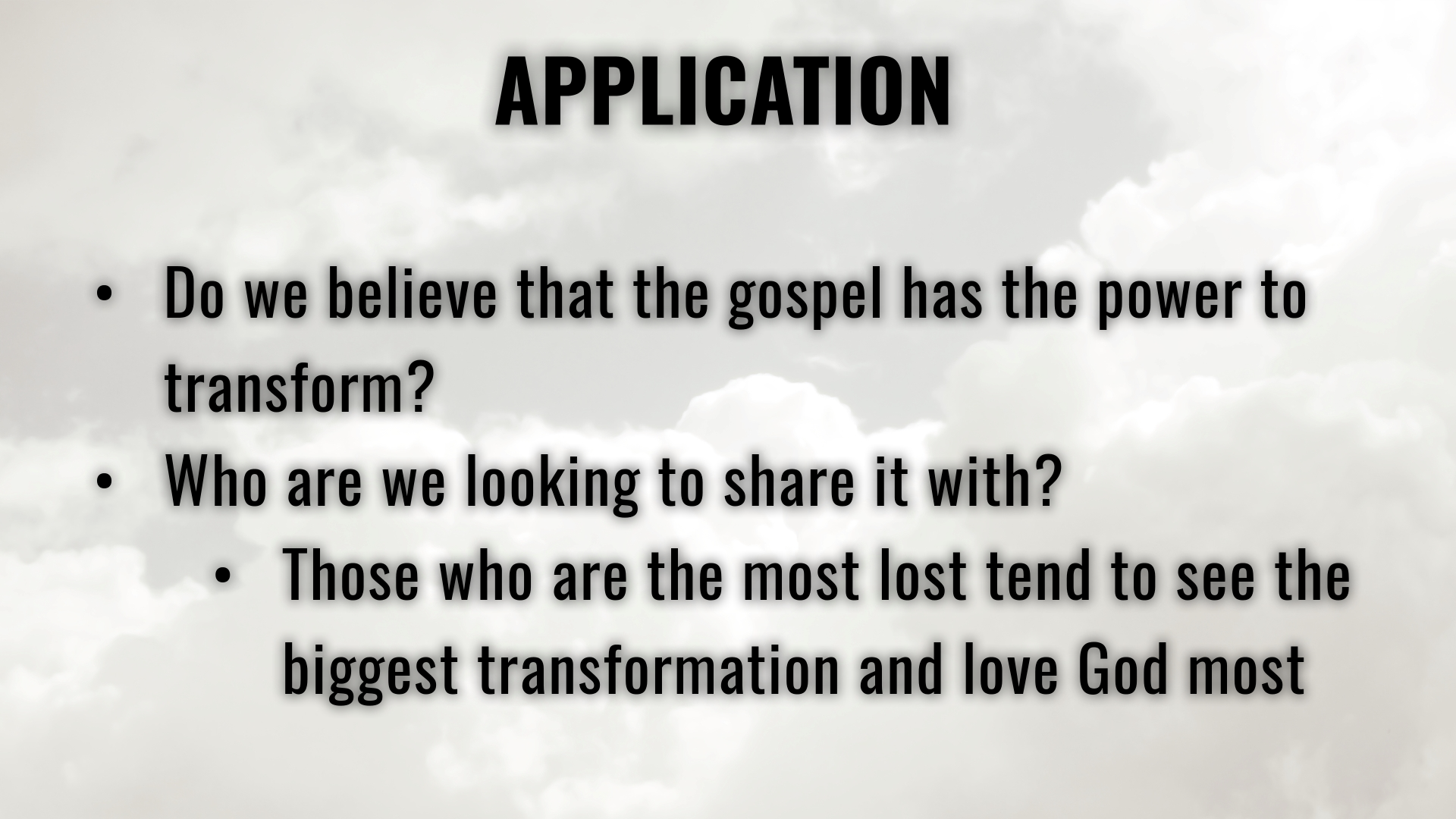Abound (1 Thessalonians)
So he moved on to more cities, but he couldn’t help but worry about the Christians in that port city of Thessalonica. He had such little time there, and there was so much that he wanted to teach them to prepare them for the temptations and trials they would face. Eventually, he sent a young guy to them to teach them and bring back news about them.
The Letter of 1 Thessalonians is Paul’s response to Timothy’s news.
1 Thessalonians 3:6--13 (ESV) --- 6 But now that Timothy has come to us from you, and has brought us the good news of your faith and love and reported that you always remember us kindly and long to see us, as we long to see you--- 7 for this reason, brothers, in all our distress and affliction we have been comforted about you through your faith. 8 For now we live, if you are standing fast in the Lord. 9 For what thanksgiving can we return to God for you, for all the joy that we feel for your sake before our God, 10 as we pray most earnestly night and day that we may see you face to face and supply what is lacking in your faith? 11 Now may our God and Father himself, and our Lord Jesus, direct our way to you, 12 and may the Lord make you increase and abound in love for one another and for all, as we do for you, 13 so that he may establish your hearts blameless in holiness before our God and Father, at the coming of our Lord Jesus with all his saints.
This whole letter is about Paul wanting to be with the Christians there and reaffirming his love for them.
Overview
Thanksgiving (1.1-10)
The first section of the book is Paul’s introduction and thanksgiving. Paul wants these Christians to know that he is thankful for them. He has heard of their faith, hope, and love. He knows that they are seeking to imitate Paul and his fellow workers. These men and women are not afraid of suffering for Christ. They love Paul, Silas, and Timothy for the wonderful news that they received from them.
A Church Planter (2:1-16)
The following section describes who Paul is and where his message comes from. He wanted to ingrain this truth in these new Christians. Paul is not teaching man’s wisdom. He is teaching God’s words with complete honesty and sincerity. He is not trying to take advantage of men but to serve them with the gospel. He knows that men will come in and try to discredit him, so he wants to cut that off before it starts.
Paul has worked hard among them. He never took advantage. Instead, he cared for them like an affectionate and gentle mother. He encouraged them and charged them like a respectable father. Paul and his companions tried to be what these Christians needed while they were there. They tried to set an example for them to follow. They endured suffering in front of them, and they showed them the way of Christ. Now he has heard that they are suffering as well. They are going through the same types of suffering all Christians everywhere have endured. They are sharing in the suffering that Christ has experienced. Paul says that the same wicked people who killed the prophets and Jesus drove Paul out. These men displease God and oppose all mankind by keeping the Gentiles from hearing the gospel.
1 Thessalonians 2:16 (ESV) --- 16 by hindering us from speaking to the Gentiles that they might be saved---so as always to fill up the measure of their sins. But wrath has come upon them at last!
This section serves as a warning and an encouragement. Paul wants his example to be firmly fixed in their minds even though he was only with them for a short time. They need to continue to believe the word of God that Paul shared with them, and they need to be prepared to face men who will cause their suffering.
But he also gives them words of comfort. First, he says that these men are filling up the measure of their sins. Then, he says that “wrath has come upon them at last!” Those who are troubling them are being punished for their evil.
A Church That Gets It (2:17-3:13)
In the rest of Chapter 2 and Chapter 3, Paul tells them his perspective on all of the events that have taken place. He wants them to know that he considers them to be his glory and joy. Their faithfulness in trials has let Paul and his companions know that their faith is genuine. This energizes Paul and encourages him. These people mainly were Gentiles who believed in the gospel. Who would have thought that these thoroughly pagan and ignorant people would devote themselves to Christ like this?
Paul is so grateful to hear of their faith. Again, listen to his words about how he feels for them.
1 Thessalonians 3:9--13 (ESV) --- 9 For what thanksgiving can we return to God for you, for all the joy that we feel for your sake before our God, 10 as we pray most earnestly night and day that we may see you face to face and supply what is lacking in your faith? 11 Now may our God and Father himself, and our Lord Jesus, direct our way to you, 12 and may the Lord make you increase and abound in love for one another and for all, as we do for you, 13 so that he may establish your hearts blameless in holiness before our God and Father, at the coming of our Lord Jesus with all his saints.
He loves them and wants God to work great things in them to the praise of his glory.
Righteousness & Love (4:1-12)
Chapter 4 begins with the word “Finally” because he is shifting focus. After talking extensively about the past, he begins to focus on their future. They have been faithful thus far, but now they need to focus on becoming even more righteous for Christ. God’s will for them is to be sanctified or made holy and righteous for God. He doesn’t want there to be any sexual immorality or impurity in them. Instead, he wants them to exercise self-control and reign in their passions in obedience to the Holy Spirit’s message.
In verse 9, he tells them also to have a love for everyone. He wants them to show love by treating one another with kindness, but he also describes love in an interesting way. He says you show love by living quietly, minding your business, and working for yourself. That’s kind of odd. How do these show love?
How does living quietly show love? Those who have love aren’t trying to be disruptive. They don’t become loud and cause a scene wherever they go. Christianity is not an annoying religion. Our goal is to show love and respect for others.
How does minding your business show love? Our mission is to tell people that they are sinners, but we don’t need to know the details. It’s not our job to weed out every sin for everyone else. Our mission is to share the gospel and let it work itself out in the lives of others. So many times, I have heard of Christians trying to stick their nose in business that has nothing to do with them. Jesus wants us to focus on our plank first. If someone comes to us with a problem, the loving thing to do is check ourselves first. It is not loving to try to dig deeper into every sin. Usually, addressing the heart issue will help people see the details of their sin. All who love God pursue clean lives without sin. We don’t need to police the church.
Also, he says to do your own work. This is loving because you aren’t making other people do what you could easily do. It’s not a very loving thing to sit back and let other people do what you could easily do. He says this especially about loving those outside the church. Our goal is not to be dependent on others unnecessarily. This will show that we love others. It’s a loving thing to take the burden off of other people, not to increase their burden. This will also come up in the second letter to the Thessalonians. When we think about it, becoming dependent on no one will also be extremely helpful when afflictions come. People will not have a tool to use against you.
Waiting For Jesus’ Return (4:13-5:11)
One of the difficult things about reading this letter is the messed up Chapter division. The end of Chapter 4 goes with Chapter 5. At the end of Chapter 4, Paul tells them that they don’t need to be afraid of death. Death does not remove the opportunity to be with the Lord. Those who die in Christ will rise first, and we will meet them in the air.
Then, in Chapter 5, he says that the day of the Lord’s return will be like a thief coming in the night. No one will expect it to happen. Then, it will take place suddenly. So he tells them to be spiritually awake until that day. Essentially Paul tells the Thessalonians the same message that Jesus tells his disciples in Matthew 24-25, but he gives them a more detailed version that fits in with the end of the world. His goal is to promote faithfulness, just like Jesus was trying to promote faithfulness with his disciples. The prize of eternity with Christ is just up ahead!
1 Thessalonians 5:9--10 (ESV) --- 9 For God has not destined us for wrath, but to obtain salvation through our Lord Jesus Christ, 10 who died for us so that whether we are awake or asleep we might live with him.
Be Devoted To Good Works (5:12-24)
To round out the message, Paul wants to encourage the Thessalonians to engage in good works. He gives them a few things to work on in verses 12-22.
1 Thessalonians 5:12--22 (ESV) --- 12 We ask you, brothers, to respect those who labor among you and are over you in the Lord and admonish you, 13 and to esteem them very highly in love because of their work. Be at peace among yourselves. 14 And we urge you, brothers, admonish the idle, encourage the fainthearted, help the weak, be patient with them all. 15 See that no one repays anyone evil for evil, but always seek to do good to one another and to everyone. 16 Rejoice always, 17 pray without ceasing, 18 give thanks in all circumstances; for this is the will of God in Christ Jesus for you. 19 Do not quench the Spirit. 20 Do not despise prophecies, 21 but test everything; hold fast what is good. 22 Abstain from every form of evil.
In this section, he gives them the more common description of loving their brethren. He wants them to respect those who work for them and over them. Those bringing them admonishment from the word need to be highly esteemed in love because of their work. He also tells them to be at peace but to admonish the idle, encourage the fainthearted, help the weak, be patient, and pursue what is good for others instead of seeking retribution. He wants them to show genuine love for one another and to live sacrificially.
Then, he moves into their focus and attitude. He wants them to rejoice always. That’s hard to do, especially when suffering, but Paul says that because of the tremendous blessings we have in Christ. We can know that our suffering is an opportunity to show faith and glorify God. We are following in the footsteps of Christ. Then, he says to pray without ceasing, give thanks in everything, not quench the Spirit, and test everything. This is a rundown of how they need to consider God’s will for them. They need to pray with thankful hearts, saying, “your will be done.” They need to pursue the truth of the word but not be open to every teaching that comes from it. Men will abuse the word to say what they want to say. It’s essential to test their words to see if they hold up to the truth.
He ends this section by telling them to stay away from every form of evil. That includes the obvious and the not-so-apparent kinds. Every form of evil needs to be removed from our lives. This is a lifelong pursuit.
Ending
The final six verses are words of encouragement that God will work to help them be righteous and remain faithful. He is working in them to accomplish the spread of the gospel and the glorification of his name.
What Does It Mean?
As we look at this letter, I see three main ideas that we can learn.
The third lesson is that God’s wrath is coming upon all who rebel against him. Judgment day is described to us so that we will be encouraged to remain faithful until death. We don’t need to worry about those who want us to stop teaching the truth. We don’t need to worry about those who take away our money and possessions. They can’t take away the hope we have in Christ, and there is a promise that wrath is coming upon all who refuse to repent.
The second lesson is that Paul loves these Christians. He loves them so much that he becomes worried about them and sends someone to help them and check on them. He knows that these new Christians will have it more difficult than just about anyone because of their limited training and brutal persecution. But he tells them that they are his and his companion’s joy and glory. He says that their faithfulness brings them much comfort that it’s all worth it. They aren’t just out here getting themselves killed so that people will believe and then fall away. These seemingly pagan and wicked people have a heart that genuinely loves the Lord and has been transformed by the gospel.
That brings us to our final and most crucial point. This letter tells us that the gospel has the power to transform wicked people completely. These Gentiles might be rough around the edges, but they have a heart that wants a relationship with their God through Jesus. They are looking forward to the coming day when they are resurrected to be with Christ. Listen to the encouraging description of these Christians.
1 Thessalonians 1:8--10 (ESV) --- 8 For not only has the word of the Lord sounded forth from you in Macedonia and Achaia, but your faith in God has gone forth everywhere, so that we need not say anything. 9 For they themselves report concerning us the kind of reception we had among you, and how you turned to God from idols to serve the living and true God, 10 and to wait for his Son from heaven, whom he raised from the dead, Jesus who delivers us from the wrath to come.
They are on fire for the Lord. What a statement.
Application
To close, let’s think about the importance of this final lesson. Do we believe that the gospel has the power to transform? If we say, “Yes,” then who are we willing to share the gospel with? Those who seem the most lost and the most unlikely to be faithful might be the purest in heart. They might be the poor in spirit. Often, the most righteous-looking people are the most arrogant in spirit. If we opened up our pool of influence just a little, we might find the harvest white and ready to be reaped.
Paul stepped out in faith, went to an evil city, and preached to lost souls. These men and women who heard the gospel preached to them became faithful even though they were suffering for it. That’s how strongly they held to their beliefs. The church doesn’t need men and women who know how to play church. We need men and women who have a heart that is zealous to serve the Lord. Would Paul write this kind of letter to us? Would he see us as his joy and his glory because of our faith after hearing the gospel preached?
Conclusion
Jesus has given us tremendous hope in the gospel. This is a hope that causes us to lay our lives down with rejoicing. Why? Because we love Christ and love others. We even love those who are nothing like us, as Paul did when he preached to the Greek Thessalonians. The gospel is that Jesus did that for everyone who submits to him. It doesn’t matter where you have been or what you have done. If you consider yourself unworthy, you are just the person he is looking for. In this kingdom, the least is the greatest, and the greatest is the least.
When Paul sends to the Thessalonian church, he knows what they are going through, worried that they would falter. But he finds them faithfully holding true to the example they received in Paul, Silas, and Timothy. We must make sure that we follow the pattern of righteousness and love given to us by the apostles and the church in Thessalonica.





